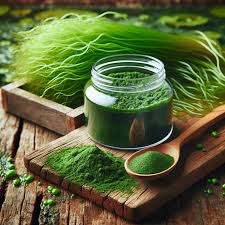
In the ever-evolving world of health and wellness, superfoods come and go. Yet, one trend that has been gaining significant attention recently is algae. While algae might not be the first thing that comes to mind when you think of superfoods, its potential health benefits are impressive—and many people are now incorporating it into their diets in various forms.
From spirulina to chlorella, algae offers a variety of nutrients that can boost overall health. This blog will explore the benefits of algae as a superfood and how you can start adding it to your diet for better health.
What is Algae?
Algae are a diverse group of aquatic plants, ranging from microscopic phytoplankton to larger seaweeds. While many types of algae exist, the most commonly used for their health benefits are:
- Spirulina: A blue-green algae that is packed with protein, vitamins, and minerals.
- Chlorella: A green algae known for its detoxifying properties and high chlorophyll content.
- Seaweed: An edible algae, often found in varieties like nori, wakame, and kelp, commonly used in sushi and salads.
These types of algae are rich in essential nutrients, making them a valuable addition to any healthy diet. So, why are they becoming so popular?
The Health Benefits of Algae
- Rich Source of Protein
One of the standout features of algae, particularly spirulina, is its high protein content. Spirulina contains about 60-70% protein by weight, which is more than most animal-based sources. It’s an excellent option for vegetarians, vegans, or anyone looking to add more plant-based protein to their diet.
Algae proteins also contain all nine essential amino acids, making them a complete protein source. This makes them a great alternative to animal proteins and helps support muscle growth, repair, and overall body function.
- Packed with Vitamins and Minerals
Algae are nutrient-dense, providing a variety of vitamins and minerals that are essential for overall health. For example:
- Vitamin B12: Algae, particularly spirulina, are a rare plant-based source of vitamin B12, which is vital for energy production and nerve health.
- Iron: Algae like chlorella are high in iron, which helps combat fatigue and supports healthy blood cells.
- Iodine: Seaweed is rich in iodine, a mineral essential for proper thyroid function and metabolism regulation.
Additionally, algae are packed with antioxidants, which help fight free radicals and reduce oxidative stress in the body.
- Boosts Immune Function
Algae are known for their immune-boosting properties. Both spirulina and chlorella have been found to enhance the body’s immune response by increasing the production of white blood cells. These cells help fight infections and promote overall immune health.
Moreover, chlorella has been shown to support the body’s detoxification processes, removing harmful toxins and heavy metals, which can improve immune function and overall wellness.
- Supports Heart Health
Research suggests that algae may contribute to heart health by lowering cholesterol and reducing blood pressure. Spirulina, in particular, has been shown to lower LDL (bad) cholesterol while increasing HDL (good) cholesterol levels. This can contribute to a healthier cardiovascular system and reduce the risk of heart disease.
Algae’s high content of omega-3 fatty acids—especially in certain seaweeds—can also help reduce inflammation and improve heart health by supporting healthy blood circulation and lowering triglyceride levels.
- Improves Digestion
Certain types of algae, like chlorella, contain a high concentration of fiber, which supports digestive health. Fiber helps regulate bowel movements, prevent constipation, and support a healthy gut microbiome. Additionally, algae have been shown to help repair the gut lining, promoting better nutrient absorption and overall digestive function.
- Supports Detoxification
Algae, particularly chlorella, are excellent detoxifiers. Chlorella binds to heavy metals and toxins in the body, helping to remove them through the digestive system. This detoxifying effect is particularly useful for people who live in polluted environments or those who may have been exposed to environmental toxins.
The detoxification properties of algae can help improve liver function, boost energy levels, and reduce the burden on the body’s natural cleansing systems.
How to Add Algae to Your Diet
The great thing about algae is that it’s versatile and can be easily incorporated into various meals. Here are some simple ways to add algae to your diet:
- Smoothies: Add spirulina or chlorella powder to your morning smoothie. Just a small teaspoon will give your smoothie a powerful nutrient boost.
- Salads: Sprinkle some seaweed flakes, such as nori or kelp, onto your salads for added flavor and nutrients.
- Supplements: Algae is available in supplement form—both spirulina and chlorella capsules are widely available, making it easy to get your daily dose.
- Snacks: Seaweed snacks, often found in most health food stores, are a delicious and easy way to enjoy the benefits of algae.
Things to Keep in Mind
While algae is a superfood with many health benefits, it’s important to consume it in moderation. Excessive intake of certain algae, especially seaweed, can lead to an overabundance of iodine, which may impact thyroid function. It’s also best to purchase algae from reputable sources to ensure they’re free from contaminants like heavy metals.
Before adding algae supplements or large amounts to your diet, consider consulting with a healthcare provider, especially if you have thyroid conditions or are on medication.
Final Thoughts
The rise of algae as a superfood is not just a passing trend—its impressive nutritional profile and health benefits make it a valuable addition to any diet. From boosting immunity and heart health to improving digestion and detoxifying the body, algae has a lot to offer. Whether in powder, supplement, or snack form, incorporating algae into your daily routine can enhance your well-being and help you thrive in today’s health-conscious world.
So, why not give algae a try and explore the many ways this ancient superfood can benefit your modern lifestyle?
